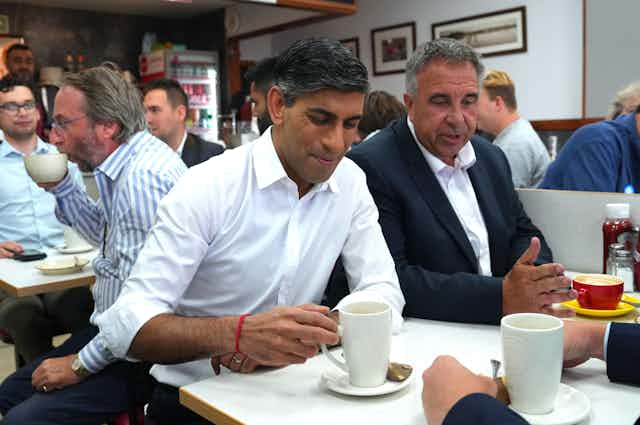It says much of the Conservatives’ current plight that a win of just 495 votes is being hailed with relief inside the party.
The Conservatives narrowly avoided a total wipeout in the July 20 trio of byelections, successfully defending Boris Johnson’s former seat in Uxbridge and South Ruislip with the election of Steve Tuckwell. The unpopularity of London Labour Mayor’s Sadiq Khan’s expansion of the ultra low emissions zone (Ulez) undoubtedly contributed to the Conservative defence of Uxbridge.
But the party’s losses in Somerton and Frome in Somerset, and Selby and Ainsty in North Yorkshire, are notable.
So far in this parliamentary term, the Conservatives have had to defend nine seats. They have now held three.
The win in Uxbridge followed Old Bexley and Sidcup in 2021, after the death of former cabinet minister James Brokenshire. The other was in Southend West in 2022, a race uncontested by the other main parties following the murder of previous MP David Amess.
Of the six losses, four have been to the Liberal Democrats, on a staggering average 29% swing. The byelection in Somerton and Frome, after the resignation of Conservative MP David Warburton following allegations of misconduct, marked another win for the Liberal Democrats.
Historic Labour win
Selby and Ainsty was the Conservatives’ second byelection loss to Labour during this term, and it was significant.
The result was worse for the Conservatives than their previous loss to Keir Starmer’s party in Wakefield. That saw “only” a 12.6% swing to Labour, barely guaranteed to give the opposition an overall majority.
But Selby and Ainsty was one of the Conservatives’ safest northern seats, a 20,137 majority lost on a huge 23.7% swing. Voters seem to have been unimpressed by their MP, former Cabinet Office minister Nigel Adams, standing down when he did not receive a peerage. He’s now been replaced by Labour’s Keir Mather, who at 25 is the youngest member of parliament.
Turnout in Selby was down by 20,000. The Conservatives can hope that most of those 20,000 were their followers who will turn up on general election day, but it’s a leap of faith.

Echoes from history
This is all reminiscent of when the Conservatives last crashed out of office in 1997. During the 1992-97 parliament, the Conservatives lost all eight seats they defended in byelections: four to the Liberal Democrats, three to Labour and one to the SNP.
The average swing from the Conservatives to Labour and to the Liberal Democrats then was a whopping 23% – almost identical to the Selby and Ainsty swing – a clear portent of the looming and catastrophic Conservative defeat in 1997, their worst ever.
The Conservatives are now braced once again for the worst. Thirty-six MPs, including six former cabinet ministers, have announced they will be standing down at the next election, even though the contest is surely more than a year away.
For a while, some clung to the hope that Sunak and Starmer’s popularity ratings were close enough to give them a chance. No leader trailing on the question of “who do you think would make the best prime minister?” has won a general election since Margaret Thatcher in 1979. But Sunak now trails the Labour leader by ten percentage points.
What the future holds for the Conservatives
The bad news is far from over for Sunak. It seems highly likely the eight-week suspension from the Commons of Conservative MP Chris Pincher for allegedly groping two men will trigger a byelection in Tamworth this autumn. Under the Recall of MPs Act, only 10% of constituents need to sign a petition to generate the contest. And we saw what happened to the 20,000 Conservative majority in Selby.
An autumn byelection would be most unwelcome for a Conservative Party attempting a relaunch at its conference in Manchester in October. And at some point, Nadine Dorries will end the longest resignation in political history and step down from her Mid-Bedfordshire seat. Cue another byelection.

Still, there are three glimmers of hope, however faint, for the current government.
One is that inflation is finally beginning to fall, which may help reduce the current level of strikes. More working days were lost in the final quarter of last year than at any time since the 1980s.
Two is that the Conservatives have one final budget with which to put more money in people’s pockets. While tax cuts might be too blatant an electioneering ploy, we might expect a rise in tax thresholds.
Three is that the issue shaping the Uxbridge and South Ruislip result shows the problem Keir Starmer has in developing policies. The Labour leader’s only big new idea at last year’s party conference in Liverpool was a “new green economy” and he has been in retreat from it since. Everyone agrees with green policies until they are affected by them, and the reaction to Ulez in Uxbridge suggests elections may still trump the environment.
Sunak insists the result in Selby shows the general election is not a “done deal”. But the expectation remains overwhelmingly of a Labour government in autumn 2024. The debate is whether it will have an overall majority.

